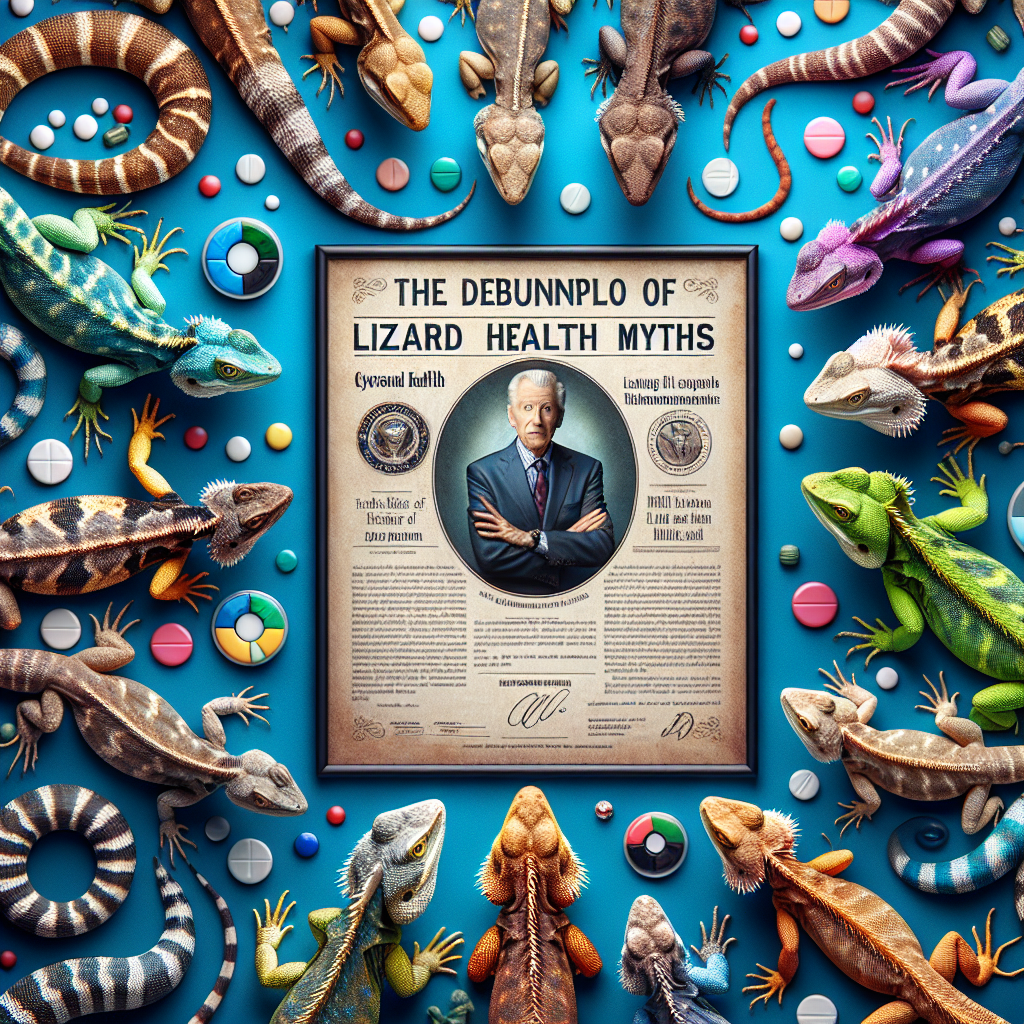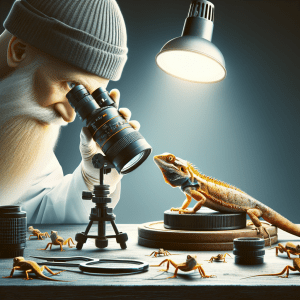Introduction: Lizard Health Myths Debunked
Have you ever wondered about the health myths surrounding lizards? It’s fascinating how misconceptions can spread like wildfire, even in the world of reptile care. Think about the times you may have heard conflicting advice about how to best care for your scaly companions. It’s a jungle out there in the world of pet care, isn’t it?
Let me share a personal anecdote with you. I once believed that all lizards need constant exposure to UV light for their health. It was a common myth that had been circulating among lizard owners for years. However, after diving into some research, I discovered that while UV light is essential for some lizard species, others can actually be harmed by excessive exposure. It made me realize the importance of debunking these myths to ensure the well-being of our reptilian friends.
Understanding the common myths about lizard health is crucial for every pet owner. From misconceptions about diet and nutrition to false beliefs about habitat requirements, separating fact from fiction is the first step in providing the best care for your scaly companions. By debunking these myths, we not only ensure the health and happiness of our lizards but also contribute to the overall education and awareness in the reptile community.
So, let’s embark on this journey together as we explore the world of lizard health myths and uncover the truth behind these misconceptions. Get ready to be surprised, enlightened, and empowered with accurate information that will help you become the best lizard owner you can be. Let’s dive in and debunk those myths, one scaled tale at a time!
Common Myths About Lizard Health
Have you ever heard some of the outrageous myths floating around about lizard health? It’s like a game of telephone gone wrong! People seem to have the wildest ideas when it comes to taking care of our scaly friends. One time, I overheard someone saying that lizards don’t need any water because they absorb moisture through their skin. Can you believe that?
It’s crucial to debunk these common myths about lizard health to ensure our reptilian pals are living their best lives. Some myths can be harmful if followed, leading to serious health issues for our beloved pets. For instance, there’s this widespread belief that lizards can survive on just insects alone. But in reality, they need a well-rounded diet to thrive, including vegetables and fruits. It’s like expecting us to live on a diet of pizza and nothing else – not so great for our health either!
In debunking these myths, we’re not only setting the record straight but also empowering ourselves as responsible lizard owners. Understanding the truth behind these misconceptions allows us to provide the best care possible for our scaly companions. It’s all about being informed and making decisions based on facts rather than fiction.
So, the next time you hear someone claim that lizards don’t need any external heat sources because they are cold-blooded, you can confidently set them straight. Lizards actually require proper heating elements in their enclosures to maintain their body temperature and overall health. And remember, a well-informed lizard owner is a lizard’s best friend!
Importance of Debunking Health Myths for Lizard Owners
Have you ever come across those quirky health tips for lizards that make you raise an eyebrow? Well, let’s dive into why debunking these myths is crucial for all lizard owners. Picture this: you’ve just brought home your new scaly friend, and you’re excited to give them the best care possible. But, amidst the sea of information out there, how do you separate fact from fiction when it comes to your lizard’s health?
One fascinating aspect of debunking health myths for lizards is how it empowers us as responsible pet owners. It’s like being a detective, sorting through the evidence to uncover the truth behind what our little reptilian buddies really need to thrive. By challenging these misconceptions, we not only ensure our lizards lead healthy lives but also deepen our understanding of their unique needs.
You see, the internet can be a treasure trove of information, but it’s also a breeding ground for myths and misinformation. One common myth I stumbled upon was the idea that all lizards require the same diet and habitat conditions. But here’s the kicker: each lizard species has specific requirements based on their natural habitat and biology. By debunking this myth, we learn to tailor our care practices to suit our lizard’s individual needs, setting them up for a happy and healthy life.
So, here’s the million-dollar question: How do we navigate this maze of myths and truths to give our scaly friends the best possible care? Well, it starts with a willingness to question, research, and seek advice from reputable sources. By staying curious and open-minded, we can sift through the noise and find the nuggets of truth that will benefit our lizard companions in the long run.
Debunking health myths isn’t just about correcting misinformation; it’s about creating a foundation of knowledge that strengthens the bond between us and our reptilian pals. So, let’s roll up our sleeves, dig into the facts, and ensure our lizards live their best, healthiest lives.
Fact-Checking Popular Beliefs About Lizard Health
Have you ever heard some wild myths about lizard health that made you raise an eyebrow? It’s surprising how misinformation can spread like wildfire, especially in the world of pet care. Let me debunk some of these myths and set the record straight for you.
So, let’s get down to business. Did you know that one common myth about lizard health is that they don’t need much water? It’s a misconception that lizards can survive solely on moisture from their food. In reality, lizards require a separate water source to stay hydrated. This myth can lead to serious health issues if not addressed properly.
Now, picture this: you walk into a pet store, and the salesperson tells you that lizards don’t need any special lighting in their habitat. Sounds convenient, right? Well, the truth is, proper lighting is crucial for a lizard’s health. They need UVB light to metabolize calcium and maintain strong bones. Without it, they can develop serious health problems like metabolic bone disease.
It’s fascinating how these myths can persist, isn’t it? People mean well, but sometimes misinformation can do more harm than good. That’s why it’s essential to fact-check and consult reliable sources when it comes to caring for your pet lizard. By busting these myths, we can ensure that our scaly friends lead happy and healthy lives.
So, next time you hear a myth about lizard health, remember to dig deeper and separate fact from fiction. Your lizard will thank you for it!
Expert Insights on Lizard Health Myths
Have you ever wondered how experts actually go about debunking health myths related to lizards? It’s quite fascinating, really. These experts delve deep into scientific research, consult with experienced herpetologists, and analyze data to separate fact from fiction when it comes to the health of our scaly friends.
One interesting fact about debunking lizard health myths is that it often involves a lot of myth-busting techniques that challenge our preconceived notions. For instance, some myths suggest that all lizards require the same type of care and diet, which is far from the truth. Experts carefully study the unique needs of different lizard species to provide tailored recommendations for optimal health.
During my research on this topic, I came across a practical tip that can help lizard owners ensure their pets remain healthy and happy. It’s crucial to regularly monitor your lizard’s behavior, appetite, and physical appearance. Any unusual signs or symptoms should be promptly addressed by a veterinarian specializing in reptile care. By staying vigilant and proactive, you can catch potential health issues early on and take necessary steps to address them.
When you think about the broader implications of debunking lizard health myths, it’s not just about setting the record straight—it’s about promoting responsible pet ownership. By educating ourselves and others about the proper care and health needs of lizards, we can create a community of informed and compassionate lizard owners who prioritize the well-being of their scaly companions.
So, the next time you come across a questionable claim about lizard health, remember the importance of seeking accurate information and relying on expert advice to ensure that your pet lizard leads a long and healthy life. Let’s debunk those myths together and give our lizard friends the care they truly deserve.
How to Properly Care for Your Pet Lizard
When it comes to properly caring for your pet lizard, there are a few key factors to keep in mind. You see, lizards have specific health needs that require a little extra attention compared to other pets. One practical tip I’ve found really helpful is to ensure that your lizard’s enclosure is set up correctly. This means providing the right temperature, humidity levels, and lighting to mimic their natural habitat.
I remember when I first got my pet lizard, I was a bit overwhelmed by all the conflicting information out there about how to care for them. One interesting fact I learned along the way is that different species of lizards have varying dietary requirements. For example, some lizards are herbivores, while others are insectivores. It’s important to research and understand what your specific lizard needs to thrive.
Now, let’s delve into the importance of a proper diet for your pet lizard. Providing a diverse and balanced diet is crucial for their overall health and well-being. This includes offering a variety of insects, fruits, and vegetables to ensure they are getting all the essential nutrients they need. Remember, a healthy diet is key to preventing common health issues in lizards.
Another practical tip is to regularly monitor your lizard’s behavior and appearance. By keeping an eye on their activity levels, appetite, and skin condition, you can quickly spot any potential health concerns. This proactive approach can help you address any issues early on and prevent them from escalating.
So, the next time you’re caring for your pet lizard, remember to create a comfortable and stimulating environment, provide a balanced diet, and keep a close eye on their health. By following these simple tips, you can ensure that your lizard stays happy and healthy for years to come.
Debunking Myths: Lizard Diet and Nutrition
When it comes to debunking myths about a lizard’s diet and nutrition, it’s crucial to separate fact from fiction. I remember when I first got my bearded dragon, and I was bombarded with conflicting advice on what to feed him. It was overwhelming!
I learned that one common myth is that all lizards can survive on a diet of just insects. While it’s true that many lizards are insectivores, their dietary needs can vary depending on the species. Some lizards, like iguanas, require a diet that includes a lot of leafy greens and vegetables to thrive.
Did you know that certain fruits and vegetables can be toxic to certain lizard species? It’s essential to do your research and ensure you’re feeding your lizard a balanced and nutritious diet to keep them healthy.
One practical tip I’ve found helpful is to provide a variety of food options for your lizard. This mimics their natural diet in the wild and helps ensure they’re getting all the nutrients they need. Offering a mix of insects, vegetables, and fruits can help prevent nutritional deficiencies and keep your lizard happy and healthy.
Have you ever wondered why some lizards are more prone to obesity than others? It’s fascinating to explore the impact of diet on a lizard’s overall health and well-being. By understanding their dietary needs and debunking common myths, you can provide the best care for your scaly companion.
Understanding the Health Needs of Different Lizard Species
Have you ever wondered why different lizard species have unique health needs? It’s like having a diverse group of friends with specific preferences and quirks. Just like how your chatty friend may need constant social interaction to thrive, some lizard species require specific environmental conditions to stay healthy.
For instance, did you know that bearded dragons, known for their friendly demeanor, have different dietary requirements compared to geckos? It’s like serving a vegetarian meal to a meat lover – it just won’t cut it. Understanding the distinct health needs of various lizard species is crucial for their well-being.
When caring for your pet lizard, it’s essential to consider factors such as temperature, humidity, and lighting based on their species. These environmental elements play a significant role in maintaining their health and happiness. It’s like creating a cozy atmosphere at home – a little warmth and light can make all the difference.
Navigating the intricate world of lizard care can be challenging, especially with conflicting information out there. But fear not, educating yourself about the specific requirements of your lizard species can help you provide optimal care. It’s like solving a puzzle – each piece fits perfectly once you understand the bigger picture.
So, the next time you’re setting up your lizard’s habitat or planning their diet, think about their unique needs. Consider the broader implications of providing a suitable environment for your scaly companion to thrive. After all, a healthy and content lizard is a happy lizard – and that’s a win-win for both of you!
Tips for Maintaining Optimal Health for Your Lizard
Imagine knowing the secret formula to keep your pet lizard healthy and happy. It’s all about understanding their unique health needs and tailoring their care accordingly. When it comes to maintaining optimal health for your scaly companion, there are a few key tips that can make a world of difference.
First and foremost, ensuring that your lizard has a suitable habitat is crucial. From the right temperature and humidity levels to providing ample space to roam and bask, creating an environment that mimics their natural habitat is essential for their well-being. Remember, a happy lizard is a healthy lizard!
Another important aspect of lizard care is their diet. Did you know that different lizard species have varying dietary requirements? Some lizards are strict carnivores, while others are omnivores or herbivores. Understanding what your specific lizard needs to eat is vital for their health. It’s like preparing a customized meal plan for your scaly friend!
Maintaining good hygiene practices is also key to keeping your lizard healthy. Regularly cleaning their enclosure, providing fresh water, and monitoring their overall cleanliness can help prevent illnesses and ensure they thrive in their environment.
Additionally, scheduling regular check-ups with a reptile veterinarian is a proactive way to monitor your lizard’s health and catch any potential issues early on. Just like we visit the doctor for our annual physicals, our reptile pals need their own version of healthcare too!
By following these tips and staying informed about the best practices for lizard care, you can pave the way for a long and happy life for your scaly companion. Remember, being a responsible lizard owner means being their advocate for good health and well-being.
Empowering Lizard Owners with Accurate Health Information
Imagine you have a pet lizard, and you’ve always heard various health myths floating around. It can be quite overwhelming, right? Well, that’s where debunking these myths comes in handy. By doing so, you can ensure your scaly friend is receiving the best care possible.
Let me share a personal anecdote with you. My friend once believed that feeding her lizard only crickets was the best diet. She thought it was the only way to keep her lizard healthy. But after debunking this myth, she realized the importance of a varied diet for her pet’s overall health.
Now, when it comes to debunking lizard health myths, it’s crucial to understand that not all information out there is accurate. That’s why fact-checking popular beliefs about lizard health is essential. By separating fact from fiction, you can make informed decisions regarding your pet lizard’s well-being.
One interesting fact to note is that some myths about lizard health can be harmful if followed blindly. For instance, the misconception that all lizards require the same environmental conditions can lead to serious health issues for certain species. Understanding the specific needs of your lizard is key to providing proper care.
When caring for your pet lizard, it’s vital to consider factors like diet, habitat, and overall well-being. Expert insights on lizard health myths can provide valuable guidance in ensuring your pet’s optimal health and happiness.
Debunking myths surrounding lizard diet and nutrition is particularly important. Some myths suggest feeding lizards only one type of food, which may lack essential nutrients. By exploring the truth behind these myths, you can tailor your lizard’s diet to meet its specific nutritional requirements.
Understanding the health needs of different lizard species is another crucial aspect to consider. Each species has unique characteristics and requirements, so it’s essential to educate yourself on how to best care for your particular type of lizard.
Tips for maintaining optimal health for your lizard include creating a suitable habitat, providing proper lighting and heating, and offering a balanced diet. By following these guidelines, you can help your pet lizard thrive and live a long, healthy life.
In conclusion, debunking lizard health myths empowers lizard owners with accurate information to provide the best care for their scaly companions. By educating yourself and separating fact from fiction, you can ensure your pet lizard’s well-being and happiness.




